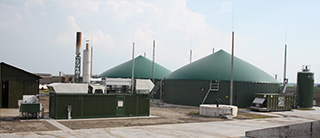A project carried out in Hungary’s South Great Plain region has contributed to boost green energy production as waste generated at an animal farm in the city of Solt is being treated to produce biogas.
- 25 January 2016
The yearly production of the Solt plant is about 2.23 million m<sup>3</sup> biogas, 4.5 GWh electricity (637 kWe installed power gas engine), 4.8 GWh heat and 22 430 tons of bio fertiliser. As a result of the direct integration of the plant with the farm’s activity, yearly 146 tons of inorganic fertiliser and 137 000 m<sup>3</sup> of natural gas have been replaced.
The ‘Biogas project in Solt’ aims at using liquid manure, plant and food industry residual materials as well as waste generated at an animal farm for renewable energy purposes. Biogas is being produced, using mesofil fermentation technology, which is being provided by UTS Biogas Ktf. This enables combined electricity and heat generation.
Utilising resources
Slurry, corn silage and waste produced at a local pig farm are also being used to produce greener energy. Those working in the project are continuously looking to boost renewable energy production and therefore on the lookout for other products that could be used including cornhusk, pea-stalk, waste potatoes, beet molasses and organic sludge.
The new plant produces over 2 billion m3 of biogas a year from liquid manure and other residual materials generated by the food industry. Biogas can generate approximately 4 500 Mwh of green electricity within the power plant. The project is therefore contributing to reduce Hungary’s greenhouse gas emissions.
Multiple energy use
Remaining thermal energy is being used for heating and drying the facilities of a neighbouring animal farm in the form of hot water. Moreover, the matured fermentation liquid – often suitable for irrigation – is used as bio manure across the neighbouring agricultural areas. In addition, it significantly reduces the negative environmental impact of artificial fertilisers.
The project has created three permanent part-time jobs. Most of the maintenance work is performed by local entrepreneurs, while there are about eight suppliers in the region selling the plant’s side products and waste.
Total investment and EU funding
Total investment for the “Biogas project in Solt” is HUF 980 521 000 (approximately EUR 3 140 571), of which the EU’s European Regional Development Fund is contributing HUF 474 278 008 (approximately EUR 1 520 233) from the Environment and Energy Efficiency Operational Programme for the 2007 to 2013 programming period.

